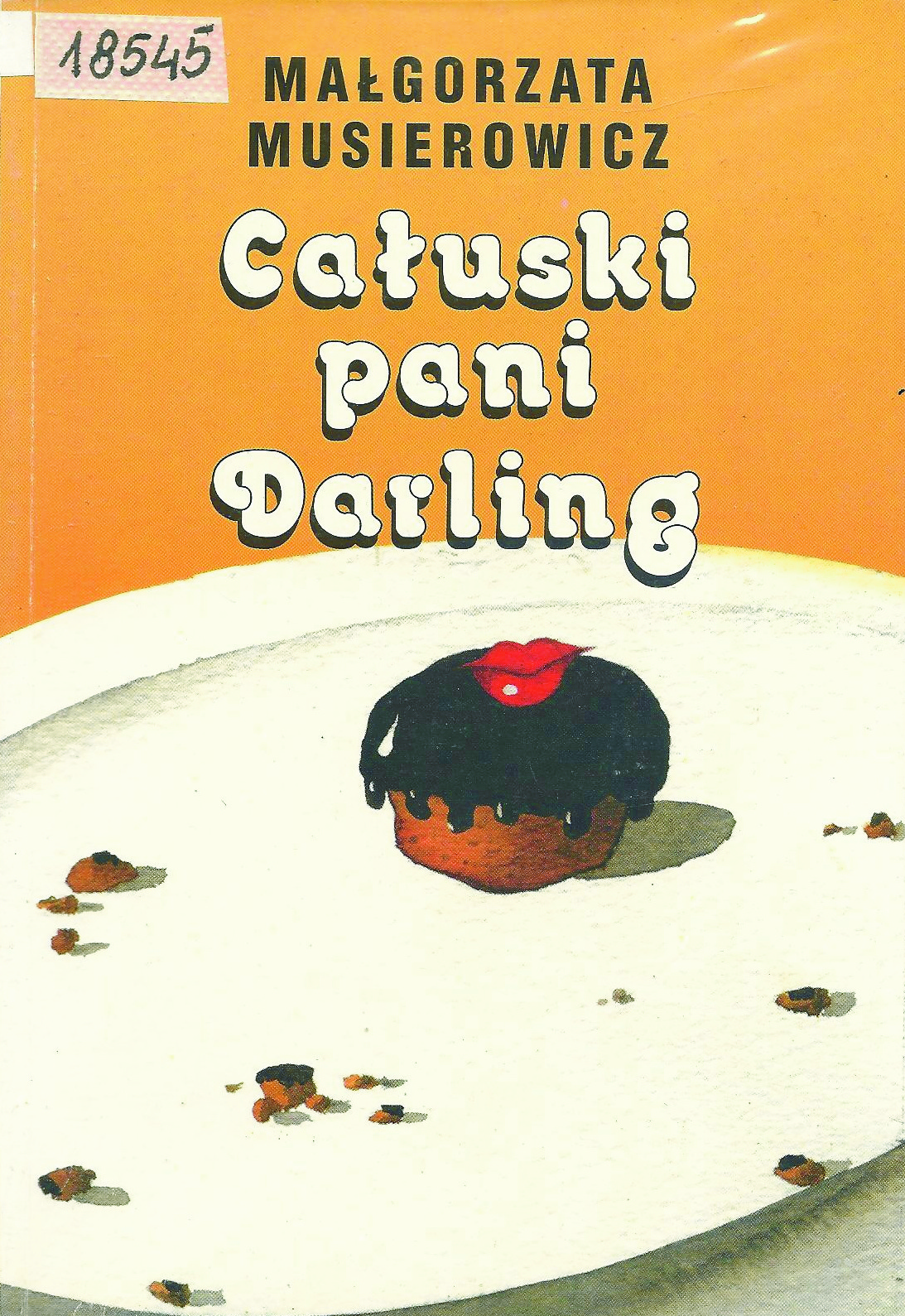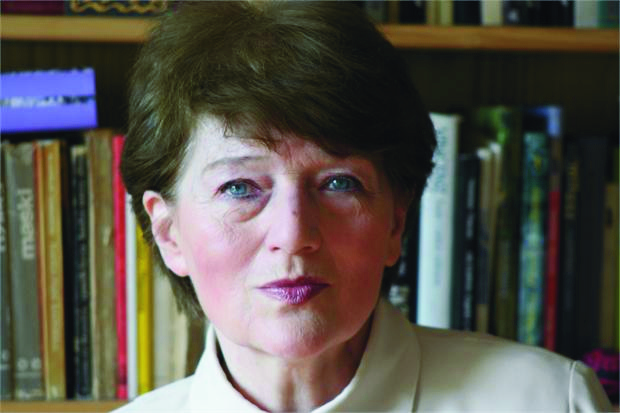Title of the work
Country of the First Edition
Country/countries of popularity
Original Language
First Edition Date
First Edition Details
Małgorzata Musierowicz, Całuski pani Darling. Łódź: Akapit Press, 1995, 179 pp.
ISBN
Genre
Cookbooks
Target Audience
Children
Cover

Courtesy of the publisher.
Author of the Entry:
Summary: Agnieszka Gąsior, University of Warsaw, aga.gasior@op.pl
Analysis: Marta Pszczolińska, University of Warsaw, m.pszczolinska@al.uw.edu.pl
Peer-reviewer of the Entry:
Katarzyna Marciniak, University of Warsaw, kamar@al.uw.edu.pl
Elżbieta Olechowska, University of Warsaw, elzbieta.olechowska@gmail.com

Photo by Emilia Kiereś.
Małgorzata Musierowicz
, b. 1945
(Author, Illustrator)
A writer and graphic designer. Sister of Stanisław Barańczak (famous Polish poet and translator), wife of Bolesław Musierowicz, a Polish architect with whom she has four children; one of her children, Emilia Kiereś is also a writer, translator and editor.
Born January 9, 1945 in Poznań. Małgorzata Musierowicz attended high school in the same city and later the School of Art, where she obtained a degree in graphic design. In the beginning of her career she published essays in the prestigious Polish weekly Tygodnik Powszechny. Her first book was entitled Małomówny i rodzina [Tight-lipped and the Family], 1975. In 1977 she began to write her hugely popular series entitled Jeżycjada [Jeżyciad]. The title was suggested by prof. Zbigniew Raszewski (1925–1992), a Polish theatre historian, on the pattern of the word Iliad (in Polish Iliada): Jeżycjada is an epic about people living in Jeżyce, a district of Poznań.
She also wrote a series of books for small children Bambolandia [Bamboland], 1978–1989, and texts for a famous series in Polish literature for small children Poczytaj mi mamo [Read to Me Mum], 1980–1987. She wrote cookbooks: Całuski pani Darling [Mrs. Darling’s Kisses], 1995; Łasuch literacki [Literary Glutton], 1995; Na Gwiazdkę [For Christmas], 2007; Musierowicz dla zakochanych [Musierowicz for Lovers], 2008; collection of essays Frywolitki [Tatted Lace], 1997–2004, and an autobiography Tym razem serio. Opowieści prawdziwe [This Time For Real. True Tales], 1994. Some of her books were made into movies. She received many literary awards: Złote Koziołki [Golden Billy Goats] for Szósta klepka [Sixth Sense], 1979; Kwiat Kalafiora [The Cauliflower in Flower], 1981, was selected for the Hans Christian Andersen Honour List in 1982; Noelka [Noëlly], 1992, has been announced a Book of the Year by the Polish section of IBBY. In 1994 she was awarded the Order of the Smile (an international award given by children for pro–children activities) and in 2008 she received a medal from IBBY’s Polish section for lifetime achievement. In 2010 Fundacja ABCXXI – Cała Polska czyta dzieciom [Foundation ABCXXI – All of Poland Reads to Kids] gave her a special award for her lifetime achievement. Until recently, she lived in Poznań, now in the countryside near Poznań.
Sources:
Official website (accessed:January 11, 2018).
"Małgorzata Musierowicz", in Nowa Encyklopedia Powszechna, vol. 4: M–P, Warszawa: Wydawnictwo Naukowe PWN, 1996, 338.
Musierowicz, Małgorzata, Tym razem serio. Opowieści prawdziwe, Łódź: Akapit Press, 1994.
Bio prepared by Joanna Kozioł, University of Warsaw, joasia7777@interia.pl
Summary
Based on: Katarzyna Marciniak, Elżbieta Olechowska, Joanna Kłos, Michał Kucharski (eds.), Polish Literature for Children & Young Adults Inspired by Classical Antiquity: A Catalogue, Faculty of “Artes Liberales”, Warsaw: University of Warsaw, 2013, 444 pp.
The book presents a variety of recipes weaved into various stories about characters known from classic children’s books (Polish and from other parts of the world), Greek and Roman mythology and history. It is designed for a young reader who would like to know how to prepare an impressive dish and who would like to learn some interesting facts in the process. The book contains about 60 easy to prepare recipes, primarily desserts, but also soups and other non-sweet dishes. In every chapter, the author presents a story or a character from a book, myth or historical event and then provides a short recipe for something to eat in some way related to the tale. A large number of chapters focus on stories from mythology and ancient history: the readers can try their hand at preparing meals such as Julian Bread, Demeter’s Cookies, Hypnos’ Cookies, Xanthippe’s Cookies, Lucullus’ Dessert, Beautiful Helen’s Pears, Shortbread Achilles’ Heels, Damocles’ Honey & Cheese Pie, Fruit Tables of Aeneas, Pyrrhus’ Breakfast, Salad for Poseidon, Diogenes’ Lentils, Witch Circe’s Special, Green Zephyr, Midas’ Golden Pears, Eris’ Golden Apples, Hercules’ Soup, Baucis’ Vegetable Soup, and Phoenix Torte. For example, in the chapter Złote jabłka bogini Eris [Eris’ Golden Apples], the readers (in this case, especially boys) are encouraged to prepare baked apples (one for each girl present at the meal) and to adorn each apple with the inscription: Dla najpiękniejszej [To the Fairest].
Describing the people and the events, the author refers to Jan Parandowski’s Mythology and provides relevant quotes from the book. There are also references to Słownik mitów i tradycji kultury [Dictionary of Myths and Cultural Traditions] by a famous Polish lexicographer Władysław Kopaliński. Occasionally, one can find the explanation of the origin of idiomatic expressions, e.g. “Pyrrhic victory.”
Analysis
This special cookbook aims not only to provide recipes easy enough to be prepared by children. The author clearly explains that, through her book, she would like to turn an ordinary child into a child aware of the connection between culinary art and culture. A child who knows that eating and cooking are not only a means of survival; a "Gourmet Child" [Dziecko Kulinarne]. Such children may then be turned into civilized children or "Children of Culture" [Dziecko Kulturalne]. Once readers learn how to prepare delicious, elegant desserts or soups, they begin to realise that every aspect of human life is a building block of culture and mastering them leads to understanding the members of a given culture. The title alludes to Mrs Darling from J. M. Barrie’s Peter Pan novels, and specifically to the lady’s description in Peter and Wendy (1911): “She was a lovely lady, with a romantic mind and such a sweet mocking mouth (…) and her sweet mocking mouth had one kiss on it that Wendy could never get, though there it was, perfectly conspicuous in the right-hand corner.”* In Polish “kisses” (całuski) is also a term for small gingerbread or shortbread cookies, or a cake similar to a doughnut. Mrs Darling’s kisses are simply cookies. In all of the cookbook’s chapters, the proposed recipes originate or are related to specific original stories.
Child readers can benefit from the book in many ways. They can please and amaze their parents and other relatives with their culinary achievements; they can learn historical, mythical or literary stories and anecdotes widely known in our society. If the children did not yet read the stories, they can learn about the various plots and funny quotes and may wish to read them later. Musierowicz selects many 19th- and early 20th-century “milestones” of children’s literature – books that were classics for her generation, but are not as popular and willingly read by today’s children, partly because they are rarely in print. The author does not reference any recent books.
There are numerous and diverse uses of Classical Antiquity. The author presents historical characters and mythical ones (gods and heroes) and explains the cultural phenomena connected to them. The myths are narrated according to the versions best known in Poland (Mythology by Jan Parandowski). Still, at the same time, Musierowicz also encourages children to read international bestsellers, such as Hawthorne or Kingsley, whom she mentions in the chapter Heracles’ Soup (p. 171). As mythology is considered an important part of cultural heritage, the recipes related to antiquity are included in about a third of all chapters (19/59). The dishes proposed are not based on authentic ancient recipes. The purpose of the book is not to present the history of cooking but rather to encourage children to abandon passive pursuits, such as television, and move them into the kitchen. Musierowicz “spices up” her culinary stories with humour adjusted to the age of the readers; it helps the child better understand and remember the stories and discover the hidden levels of meaning. The chapter Diogenes’ Lentils, where information about Diogenes is enriched with anecdotes and fun facts, provides an excellent example of such effects. Apart from the character of Diogenes, other figures are mentioned, such as Socrates, Antistenes, Aristippus, and Alexander the Great. The author also briefly discusses cynic philosophy and adds a philological explanation of the origin of the word "cynic". At the end of each chapter, there is an easy recipe. Similarly, in the chapter Julian Bread, the reader can learn how to make small loaves of garlic bread and how to recognize the difference between various calendars: Egyptian, Roman Romulus’ calendar, Julian and Gregorian, and about the historical figure of Julius Caesar.
In summary, the book increases the children’s awareness of the close relationship between myths, literature, history, food and its preparation – the secret of children’s transformation into "Gourmet Children" and "Children of Culture". It happens through cooking and reading a variety of books, including retellings of Greek and Roman mythology. When serving special dishes to their families, children additionally charm them by telling mythical stories connected with the prepared food. The author guarantees that both – serving tired parents homemade specials and telling them the tales these dishes were included in – will be a success.
* James Matthew Barrie, Peter and Wendy, London: Hodder and Stoughton, 1911, 1–2.
Further Reading
[The Author's Website] (accessed: May 6, 2022).
Kopaliński, Władysław, Słownik mitów i tradycji kultury, Warszawa: Państwowy Instytut Wydawniczy, 1996.
Parandowski, Jan, Mitologia. Wierzenia i podania Greków i Rzymian, Warszawa: Iskry, 1984.


